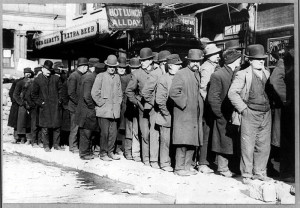The Department of Veterans Affairs (VA) proudly advertises that the disability claims backlog is now under control. Under Secretary for Benefits Alison Hickey has stated categorically that VA’s goal is to eliminate the claims backlog by the end of 2015 – “meaning all Veterans will receive timely and accurate decisions on their disability claims.”
How is this miracle possible? The answer is, it’s not possible. VA is not offering timely and accurate decisions on disability claims. Here is how they are really addressing the claims backlog:
- Stop Accepting Veterans’ Claims. Interestingly, VA’s March 30, 2015 press release crowing about its successful reduction in the claims backlog was published on a Monday. The previous Tuesday, March 24, 2015, VA stopped accepting benefits claims filed on anything other than its new form, VA Form 21-526. Stop accepting claims. That automatically reduces the number of claims filed.
Conclusion: There’s no line anymore – because we closed the store.
- Deny Claims. Another way to eliminate the backlog is simply to refuse everything. That puts the burden back on Veterans – who are limited in their response to the new, possibly illegal “Notice of Disagreement” (NOD) VA Form 21-0958.
Conclusion: Deny claims. That does move claims files along quickly.
- Appeals Aren’t Counted. Many weary, frustrated Veterans simply give up when they receive a denial from VA. Guess what? VA is counting on that. In its own presentations, VA acknowledges that – on average – only 11% to 12% of ALL VA claims decisions are appealed. VA notes that this 11-12%rate has held steady over the past 20 years. And, guess what? An even smaller percentage – only 4-5% – of decisions are finally appealed to the Board of Veterans Appeals (BVA). This 4-5% rate has also held steady over the past 20 years even though VA has received more claims submissions than ever!
Conclusion: Veterans continue to be “good soldiers” and accept VA’s incorrect decisions.
Well – wrong is wrong. VA will never be forced to really clean up its act until Veterans insist on their rights. If your claims have been denied, don’t be part of the vast majority who let VA get away with it. Appeal!
VA’s claim denials usually fall into four categories:
- VA doesn’t think there’s enough medical evidence to support your disability claim.
- VA agrees you have a disability but doesn’t believe it is service-connected.
- VA agrees that your disability is service-connected, but assigns a rating much lower than merited by your actual symptoms.
- VA agrees you have a disability, but argues your condition was pre-existing and not aggravated by military service.
Appeals are important for many reasons. First, you are entitled to accurate assessment of your disability. Second, VA’s claims-review error rate is so high you almost have to appeal. Third, VA might accurately deny claims based on the law as they understand it – and the law may change. Finally, as is notoriously the case with tactical herbicides such as “Agent Orange,” VA may be forced to acknowledge service-connection to a host of terrible ailments and offer presumptions of disability.
You Are Entitled to Representation. It won’t surprise you that it took an act of Congress, Public Law 109-461 (December 22, 2006), to allow Veterans to have representation at appeals hearings before VA. Prior to 2007 – when the law was finally implemented by VA – Veterans were on their own. Lack of representation created a dramatically unfair situation, of course. Veterans aren’t students of VA policy and practice, nor are they students of every law ever passed that might impact their benefits. No wonder the appeal rate has been historically low. Who would want to face all that bureaucracy by themselves?
Appeal Is a Right. It’s only been a few years since Veterans were finally allowed to have an advocate assist them with appeals. If your claims have been denied, get assistance with that NOD. Do not take “No” as an acceptable answer from VA. Know your rights and demand the benefits you have earned with your service and sacrifice.
Public Law 109-461 allows Veterans to hire attorneys to appeal VA benefits rulings. The Law Office of Robert B. Goss, P.C. is one of the few VA-accredited Veteran attorney firms in the United States. Contact https://www.attorneyforveterans.com/contact-us.html today for your FREE consultation.
 Military Veterans' Lawyer Blog
Military Veterans' Lawyer Blog


